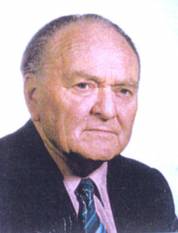Juraj Szanto was born in the part of Czechoslovakia that was annexed by Hungary in 1938. He became a doctor and journalist, and lived in Slovakia until the early 1970s. He passed away in June 2007.
”My worst memory from the time when Czechoslovakia was annexed by Hungary is how my father, a village doctor, was called up into the army, into a so-called punitive company. They sent him to the Russian front, not expecting him to return. At the same time Hungarian gendarmes took my mother into custody. She had been involved in the illegal resistance, and they took her away to prison in Budapest. As a teenager I was left alone, quite dependent on the goodwill of neighbors, friends and people I did not even know.
When Hitler’s hordes occupied Hungary in March 1944, I wanted to be closer to my mother and traveled to Budapest. My mother was released from jail, but she was kept under police supervision. We sought and found sanctuary at the Swedish Embassy, where a person from our village worked as a chauffeur. It was my job to wash cars.
In December, the Red Army surrounded Budapest, which was being fiercely defended by Hitler’s men. We were living in the middle of the crossfire and daily air raids. Of course bombs were also falling on civilian buildings, and their inhabitants were buried in the ruins. To this day I can feel in my fingers and palms, how heavy the soil was, when we dug out the already stiff body of a woman who had worked at the nearby Danish Embassy. Those were the first occasions when – as a fifteen-year-old boy – I saw a dead body.
I shall never forget the Swedish diplomats who were quite fearless and used all possible means to save Jews and illegal workers who were in danger. The bravest of all was Raoul Wallenberg, whom I only had the chance to see rarely, but I vividly remember his words of praise, thanking me for being so thorough in washing and cleaning his mud-covered car.
It wasn’t until after the war that I found out how Wallenberg had risked his own life, how bravely he had handed out Swedish protective passes, filling in the names of those he was rescuing as he went along, even going to the banks of the Danube, where Hungarian and German fascists were shooting Jews and letting their bodies fall into the river.
One thing that makes me sad is that while the whole world commemorates Wallenberg by unveiling statues and naming streets and schools after him -especially in Budapest- there isn’t any kind of memorial to Wallenberg here, either in Prague or Bratislava.”
Juraj Szanto was born in the part of Czechoslovakia that was annexed by Hungary in 1938. He became a doctor and journalist, and lived in Slovakia until the early 1970s. He passed away in June 2007.
Sources:
The IRWF thanks David Vaughan and CZRadio for providing us with Juraj Szanto’s story and authorizing its publication in our website.

